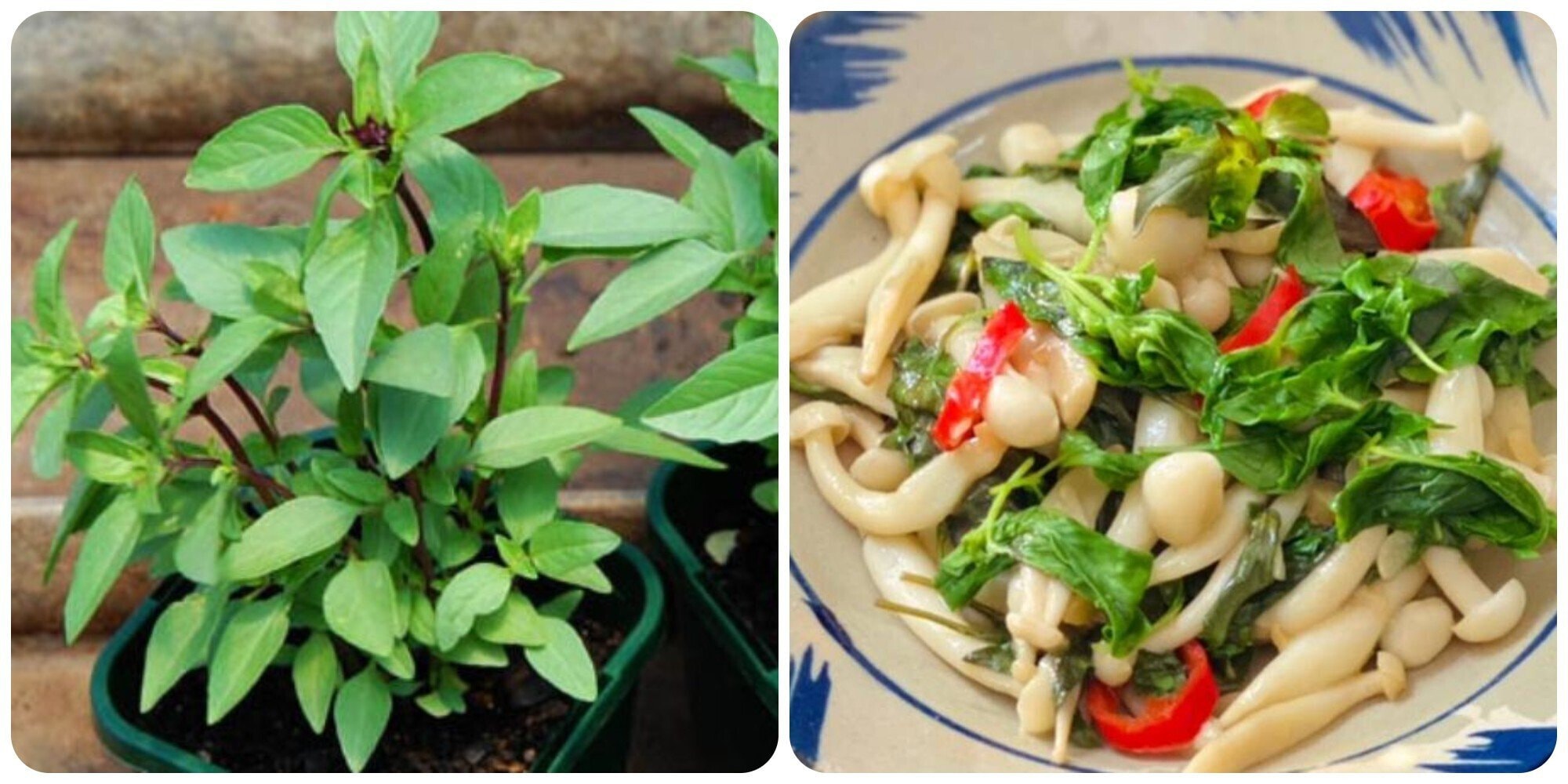What are the effects of eating basil regularly?
Basil is a spice that has many health benefits, so what are the benefits of eating basil regularly?
Overview and chemical composition of basil
Health & Life Newspaper quoted BSCK2. Tran Ngoc Que, Deputy Director of the Global Institute of Medicinal Materials, saying that basil is also known as basil, rau é, é tía, é que, huong thai. Its scientific name is Ocimum basilicum L, belonging to the Lamiaceae family (Labiatae).
Basil is a perennial herb, growing wild or cultivated, with a square stem, about 40 - 60 cm high, sometimes higher depending on the soil quality and planting distance. The leaves are oval, grow opposite, the shoots often grow from the leaf axils so the basil branches are often lush. The leaves are green with a light purple-black variety.
Flowers are small, white or purple, borne in single or branched clusters with the flowers growing in whorls of 5 to 6 flowers.
The fruit contains jet-black seeds that, when soaked in water, are surrounded by a white mucus. The roots grow shallow and spread on the ground.
BSCK2. Tran Ngoc Que said that basil contains a lot of protein (about 6% of protein), many important amino acids such as tryptophan, methionine, leucine. Basil contains about 0.4 - 0.8% light yellow essential oil, with a light, pleasant aroma.
In our country, there are many areas that grow basil on a large scale to distill essential oils for industrial use, fragrances, cosmetics, for domestic use and export.

What are the effects of eating basil regularly?
Basil is a rich source of vitamin K, especially dried basil leaves. Vitamin K helps strengthen bones and plays a big role in the body's ability to clot blood. Basil also has antibacterial and anti-inflammatory effects, improving mental health. Here are some of the benefits of regularly eating basil:
Good for digestion
Basil contains many anti-inflammatory and antioxidant compounds such as eugenol, linalool and citronellol. According to Lao Dong newspaper, citing Onlymyhealth, according to the World Health Organization (WHO) and studies from the US National Center for Complementary and Alternative Medicine (NCCIH), these compounds have the ability to reduce inflammation in the stomach and intestines, helping to reduce the risk of stomach ulcers and intestinal problems.
In addition, they also help balance intestinal bacteria, facilitating digestion and nutrient absorption.
A study published in the journal Phytotherapy Research found that basil can help reduce symptoms of bloating and indigestion. Compounds in basil leaves stimulate the secretion of digestive enzymes, which aid in the breakdown of food. This helps reduce discomfort after meals and increases the ability to absorb nutrients.
Along with that, antioxidants in basil help protect the stomach lining from the effects of free radicals, contributing to reducing the risk of damage and ulcers.
Notably, according to a report by the American Dietetic Association (AND), basil can help reduce stress, an important factor in digestive problems. Stress can upset the digestive system and cause symptoms such as stomach pain and bloating.
Eugenol, a major component in basil, is said to calm the nervous system and reduce stress, thereby improving digestive health.
Protects against cell damage
Basil leaves are rich in antioxidants, natural compounds that protect the body’s cells. Cells are vulnerable to oxidative stress when they have too many free radicals. The body creates free radicals in response to stress and inflammation. Free radicals also come from environmental exposure, such as cigarette smoke and ultraviolet (UV) radiation. Antioxidants act as a shield against free radicals—and the health problems they cause.
If left unchecked, oxidative stress can lead to health conditions including cancer, heart disease, cataracts, and inflammatory diseases like arthritis.
Support cancer prevention
Several studies have demonstrated the potential of sweet basil essential oil in preventing certain cancers. In one study, sweet basil stopped the growth of human colon cancer cells in test tubes. Basil interfered with the cancer cells’ ability to grow and divide, eventually killing them.
There is growing evidence that basil may be an effective cancer prevention tool, but more human studies are needed to confirm these promising results and understand how much basil people should consume.
Improve blood sugar levels
Both human and laboratory studies have shown basil’s remarkable ability to manage blood sugar levels. Scientists have observed that basil extract significantly reduces blood sugar levels in laboratory models of diabetes.
Human studies are in their early stages but have also shown some potential benefits for blood sugar control and type 2 diabetes. However, more research is needed to fully understand the effects of different types of basil on blood sugar health.
Helps control blood pressure and cholesterol
Traditional Chinese medicine has used basil to treat heart disease for centuries. Studies show that basil can help lower high blood pressure and improve cholesterol levels.
Additionally, basil contains eugenol, an oil that can help lower blood pressure by relaxing blood vessels./.
